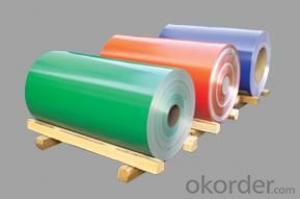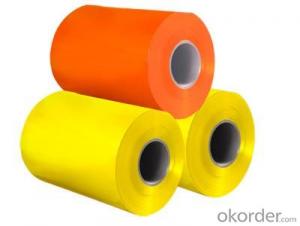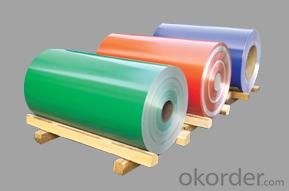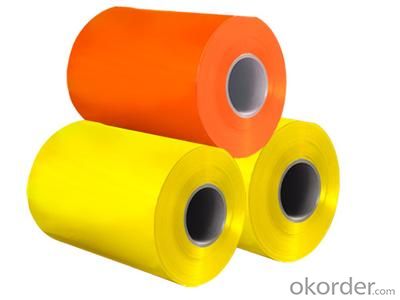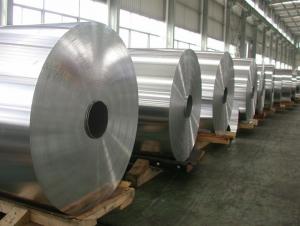Aluminum Coil Anodizers Corp Aluminum Roll, Coil to Export to Mexico
- Loading Port:
- China Main Port
- Payment Terms:
- TT OR LC
- Min Order Qty:
- -
- Supply Capability:
- -
OKorder Service Pledge
OKorder Financial Service
You Might Also Like
Aluminium is a relatively soft,durable, lightweight, ductile and malleablemetalwith appearance ranging from silvery to dull gray, depending on the surfaceroughness. It is nonmagnetic and does not easily ignite. A fresh film ofaluminium serves as a good reflector (approximately 92%) of visible light and an excellent reflector (asmuch as 98%) of medium and far infrared radiation. The yield strengthof pure aluminium is 7–11 MPa, while aluminium alloys have yield strengths ranging from200 MPa to 600 MPa. Aluminium has about one-third the density and stiffness of steel.It is easily machined, cast, drawn and extruded.
Aluminium alloys (or aluminum alloys; see spellingdifferences) are alloysin which aluminium(Al) is the predominant metal. The typical alloying elements are copper, magnesium,manganese,silicon,tin and zinc. There are twoprincipal classifications, namely casting alloys and wrought alloys, both of which are furthersubdivided into the categories heat-treatableand non-heat-treatable. About 85% of aluminium is used for wrought products,for example rolled plate, foils and extrusions.Cast aluminium alloys yield cost-effective products due to the low meltingpoint, although they generally have lower tensile strengthsthan wrought alloys. The most important cast aluminium alloy system is Al–Si,where the high levels of silicon (4.0–13%) contribute to give good castingcharacteristics. Aluminium alloys are widely used in engineering structures andcomponents where light weight or corrosion resistance is required
Alloy: AA1050, 1060, 1100, AA3003, 3005, 3015, 5052, 5754, 5083,8011,etc
Temper:H14/16/18/22/24/32,HO etc.
Thickness:0.2mm—100mm
Width:100mm—2300mm (Can be slitted)
InnerDiameter: 508MM
CoilWeight:500kg-3000kg(Max.)
Application: Foil stock, Circles, Roofing, Canstock, Marine plate,Anti-sliperypurpose in vehicles, packing and appliance.
Features:
1. Excellent quality of products
2. Quick delivery
3. Best service to clients
4. BV,SGS avalible
5. No buckle o waveness
6. Tension leveling
7. Certificate of Origin
8. Form A,E
Packaging Detail: Carton ,Wooden pallet with plastic protection packing,standard seaworthy packing or as your request.
ProductionCapacity:
AnnualProduction capacity of 600,000 tons.
Products areexported to United States, Canada, U.A.E, Brazil, Mexico,Thailand, Vietnam,Nigeria etc, over 100 countries andregions all over the world.
Coveredfactories with full production line
CNBM aluminumproduction base is comprised of 18 aluminumannealers, 10 coil and foilmills, 4 continuous production lines, 2hot rolling production line and 3prepainted lines.
FAQ:
1. What is the form of payment?
Normally 30% TT, L/C
2. Type of quotation?
FOB, CFR, CIF
3. Port of loading?
Shanghai port
4. Delivery time?
30 day after client’s deposit
- Q: To put aluminum heads on my car do i have to add other things or basically can i just get them and put them on
- just put them on
- Q: This question asks for a comparison between aluminum coil and aluminum foil, highlighting their differences.
- <p>Aluminum coil and aluminum foil are both made from aluminum but differ in form and usage. Aluminum coil is a long, continuous roll of aluminum that is typically thicker and more rigid than foil. It is used in various applications such as construction, manufacturing, and packaging due to its strength and durability. Aluminum foil, on the other hand, is a thin, flexible sheet of aluminum that is often used for food packaging, cooking, and insulation. It is lighter and more delicate than coil, making it unsuitable for heavy-duty applications. The primary distinction lies in their thickness, strength, and versatility across different industries.</p>
- Q: Can aluminum coils be used in marine or saltwater environments?
- Indeed, marine or saltwater environments allow for the utilization of aluminum coils. The exceptional corrosion resistance of aluminum renders it a fitting material for a multitude of marine applications. The naturally occurring oxide layer on the exterior of aluminum acts as a shield against saltwater and other corrosive substances. This layer can be further fortified via procedures such as anodizing or painting, thereby augmenting its ability to resist corrosion. Furthermore, the lightweight nature of aluminum coils confers an advantage in marine applications where the reduction of weight is sought after. On the whole, the corrosion resistance and lightweight characteristics of aluminum coils render them a favored option in marine and saltwater environments.
- Q: Can aluminum coils be used in the production of heat exchangers?
- Indeed, the utilization of aluminum coils in the fabrication of heat exchangers is feasible. Aluminum has gained significant popularity as a preferred material for heat exchangers owing to its exceptional thermal conductivity, which facilitates effective heat transfer. Moreover, its lightweight nature and resistance to corrosion render it a durable and enduring choice for heat exchanger implementations. The incorporation of aluminum coils in heat exchangers is widespread across diverse sectors such as HVAC, refrigeration, automotive, and aerospace.
- Q: Can aluminum coils be used in water treatment plants?
- Aluminum coils have a wide range of applications in water treatment plants due to their corrosion resistance and efficiency in heat transfer. They are commonly used in heat exchangers and condensers for optimal heat transfer. In water treatment plants, aluminum coils serve various purposes. For instance, they are utilized in cooling towers to effectively remove heat from water by circulating it over the coils. This process facilitates the transfer of heat from the water to the surrounding air, resulting in the cooling of the water. Moreover, aluminum coils are also employed in the construction of evaporators, which aid in the evaporation of water during the treatment process. These coils are designed to have a large surface area, maximizing contact between the water and the aluminum surface to enhance evaporation efficiency. Additionally, aluminum coils play a crucial role in air handling units (AHUs) within water treatment plants. AHUs help regulate temperature, humidity, and air quality in the facility. The aluminum coils in AHUs contribute to the overall efficiency of the system by cooling or heating the air passing through them. However, it is important to consider the compatibility of aluminum with the specific water being treated. Certain water compositions, such as those with low pH or high levels of certain chemicals, can cause corrosion or chemical reactions that may affect the performance and durability of aluminum coils. Therefore, it is essential to assess the water composition and seek guidance from experts or manufacturers to ensure the suitability of aluminum coils for a particular water treatment application.
- Q: How are aluminum coils used in the production of HVAC ductwork?
- The production of HVAC ductwork heavily relies on the utilization of aluminum coils. These coils are crafted from top-notch aluminum material that possesses qualities such as being lightweight, long-lasting, and resistant to corrosion, thus making them the perfect choice for HVAC systems. To commence the process of incorporating aluminum coils into HVAC ductwork production, the first step involves manufacturing. Initially, the coils are rolled into thin sheets, which are then precisely cut into specific widths and lengths that match the size requirements of the ductwork. This adaptability in sizing allows for the creation of customized ductwork that fits flawlessly into various HVAC systems. Once the aluminum coils have been cut to the desired dimensions, they are then fashioned into the shape of the ductwork. This can be achieved through a variety of methods, including bending, folding, or rolling, depending on the design and specifications of the ductwork. One of the notable advantages of employing aluminum coils in HVAC ductwork production is their superb thermal conductivity. Aluminum boasts exceptional heat-conducting properties, which means it can effectively transfer heat or cold air throughout the HVAC system. This characteristic is crucial for the proper functionality of the ductwork, as it ensures the desired temperature is maintained in different areas of a building. Furthermore, aluminum coils are renowned for their resistance to corrosion, which is of utmost importance in HVAC systems. The coils are exposed to various elements, such as moisture, which can lead to rust and deterioration in other materials. However, aluminum naturally forms a protective oxide layer that prevents corrosion, guaranteeing the longevity and dependability of the HVAC ductwork. Additionally, the lightweight nature of aluminum coils makes them simple to handle and install. This decreases the labor and time required for ductwork installation, resulting in cost savings for both manufacturers and installation teams. Moreover, the lightweight nature of aluminum coils reduces the overall weight of the HVAC system, making it more energy-efficient and alleviating strain on other components. In conclusion, aluminum coils serve as an integral component in the production of HVAC ductwork. Their lightweight, durable, and corrosion-resistant properties, combined with exceptional thermal conductivity, render them ideal for efficiently circulating air throughout the HVAC system. Furthermore, their flexibility in sizing and ease of installation contribute to their widespread utilization in the HVAC industry.
- Q: What are the potential applications of mill-finished aluminum coils?
- Mill-finished aluminum coils have a wide range of potential applications due to their excellent corrosion resistance, lightweight nature, and versatility. Some common applications include roofing, insulation, cladding, automotive parts, electronic casings, and packaging materials. Additionally, mill-finished aluminum coils can be further processed or coated to suit specific needs in industries such as construction, transportation, aerospace, and consumer goods.
- Q: Can aluminum coils be used for roofing?
- Yes, aluminum coils can be used for roofing. Aluminum is a popular and commonly used material for roofing due to its durability, lightweight nature, and resistance to corrosion. It is often chosen for its ability to withstand harsh weather conditions and its long lifespan, making it a suitable option for various roofing applications.
- Q: I want to roll aluminum rolls and operate the machine for more than three years
- (2) shutdown leaves firewood period (during inductrial injury treatment and rehabilitation) according to the original wage compensation;
- Q: How do aluminum coils perform in coastal areas with high salt content?
- Aluminum coils perform relatively well in coastal areas with high salt content due to their inherent corrosion resistance. Aluminum has a natural oxide layer that forms on its surface, providing a protective barrier against saltwater and preventing corrosion. This oxide layer is highly resistant to salt-induced corrosion, making aluminum coils suitable for coastal environments. However, it is important to note that saltwater can still have some corrosive effects on aluminum over time, especially in areas with constant exposure to salt spray and high humidity. To enhance the performance and longevity of aluminum coils in such coastal areas, additional protective measures can be taken, such as applying specialized coatings or utilizing alloys with higher corrosion resistance. Regular maintenance and cleaning of the coils are also essential to remove any salt deposits that may accumulate on the surface. This can be done by rinsing the coils with fresh water periodically to remove salt residue. Additionally, avoiding the use of abrasive cleaners or harsh chemicals is crucial to prevent any damage to the protective oxide layer. Overall, while aluminum coils offer good resistance to saltwater corrosion, proper care and maintenance are still necessary to ensure optimal performance and prolong their lifespan in coastal areas with high salt content.
Send your message to us
Aluminum Coil Anodizers Corp Aluminum Roll, Coil to Export to Mexico
- Loading Port:
- China Main Port
- Payment Terms:
- TT OR LC
- Min Order Qty:
- -
- Supply Capability:
- -
OKorder Service Pledge
OKorder Financial Service
Similar products
Hot products
Hot Searches
Related keywords
